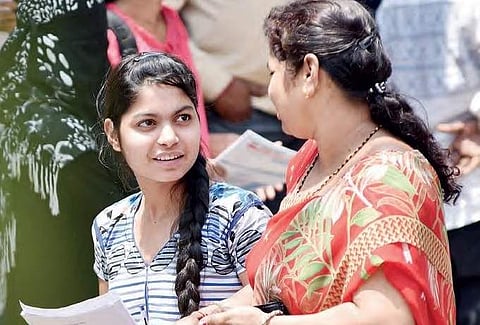

CHENNAI: Union Minister of Human Resource Development (MHRD) Prakash Javadekar last Saturday announced that NEET and IIT-JEE will be held twice a year in a fully computerised manner. However, experts opine that the new format will further privatise education and demean the value of school education system.
The Joint Entrance Examination (Mains) [JEE-Mains] and the National Eligibility-cum-Entrance Test (NEET) will now be conducted twice a year instead of just once. Students can take JEE in January and April and NEET in February and May and the best of two scores will be considered, he announced.
The two tests would be equated using psychometric methods, standardisation techniques and best of the equated scores would be used for the admissions. Such a set-up will improve transparency of the exam process.
With this move, aspirants don’t have to wait a year to take these exams again for improvement. Students can either take the exam during their schooling or right after, to enter college the next year. Students who can wait for a year, do not have to stay put till next summer to write the exams.
Several central exams to enter National Defence or Naval Academy already follow a similar pattern. However, what sets JEE and NEET apart is that the number of aspirants who take the exam are much higher. About 25 lakh students across the country took these exams in 2018.
Given that the number of seats for both medicine and engineering at prestigious institutions- are low, the exams are one that is of high stake for students. Having these exams twice would undermine the value of school education, opined educationalist Prince Gajendrababu.
Although students can write the exams just once, most aspirants will end-up taking it twice. The first set of exams, will coincide with students’ practical and model exams.
Integrated programmes to coach students for competitive exams became so rampant in Tamil Nadu, that the State government had recently issued a circular warning schools not to tie-up with private parties to engage in coaching for competitive exams. Schools often demand fees much higher the sum proposed by the fee determination committee in return for integrated training.
In a circular sent to all Chief Educational Officers of districts, it has been warned that schools which do not fall in line would have to face penal action including withdrawal of recognition. “Violation of these rules by private schools would invite stringent penal action under the stipulations of Tamilnadu Recognised Private Schools (Regulation Act) 1973,” said S Kannappan, Director of Matriculation schools.
A report by MHRD in 2016 estimated that a revenue of nearly Rs 24,000 crores per year is being involved in private coaching classes. The figure is still a rough under-statement as students who go to coaching centres, get trained for more than a year.
The report by MHRD pointed to three main concerns: “The first is philosophical (yet important). The purpose of education is refinement of the mind not passing an entrance examination. The second concerns the fact that ‘all work and no play’ makes a Plus two grade student a dull individual with less involvement in activities other than studies. The third is that students are forced to waste much time commuting in order to avail themselves of the benefit of ‘good’ coaching."
High stakes
Given that the number of seats at prestigious institutions- are low, these exams are of a high stake for students. Having them exams twice a year would undermine the value of school education, said educationalist Prince Gajendrababu.
Rural students
When reporters asked Javadekar if the computer-based tests will put rural students at a disadvantage, he defended saying that students who take these exams already have exposure to computers.